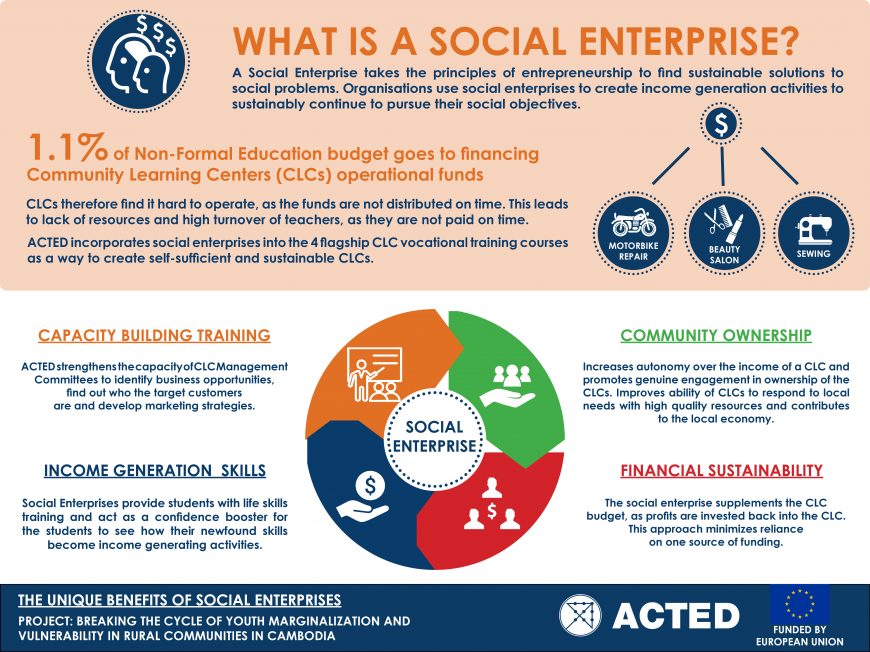Rural communes are separated from towns by treacherous dirt paths, often liable to potholes and flooding in the rainy season. Borey, a rural farmer, tries to navigate the dirt road but is unable to avoid a hidden pothole. As he pushes his bike along the path, desperately in search of someone who knows how to fix it, a member of the community points him in the direction of ACTED’s Community Learning Centre, where students of motorbike repair class are open for business.
Community Learning Centres (CLCs) offer vulnerable youth in Prey Veng a chance to learn income generation skills through vocational courses to gain meaningful employment. ACTED set up four pilot Centres, where vocational training courses are offered in beauty salon, sewing and motorbike repair.
ACTED worked with the Technical Skills Training Institute to set up capacity building training for the CLC Management Committees, who are in charge of operating and running the Centres. This training helped identify opportunities for their social enterprise and find out who the target customers are and develop a social business plan. Through this training, Chrey Commune chose motorbike repair, and Pean Roung, Purpus and Preykhla chose sewing as their social business.
Borey pushes his bike towards Chrey Commune’s Centre, where a social enterprise has been set up as part of the motorbike repair course. A social enterprise takes the principles of entrepreneurship to find sustainable solutions to social problems. Social enterprises are used to create income generation activities to sustainably continue to pursue their social objectives. At the Centres, the funds generated from the social enterprise go directly towards the financial sustainability of the Centre therefore giving ownership of the Centres back to the community.

As Borey enters the courtyard, students gather around a motorbike, watching a demonstration by the teacher on how to fix a burst tyre. Earlier that day, the students had been studying the technical vocational education and training (TVET) theory video as an addition to the practical learning the Centres provide. These theory videos provide the students with more in depth knowledge about topics taught at the Centres.
The students start working on the bike, and with supervision from the teacher are able to identify the problem and fix the bike for a small fee. Here, the students are able to transfer their newly learnt skill and experience how this skill can help generate an income for them in the future.
I am confident to repair motorbikes and I get more income running my own business. Now I don’t need to migrate to another country for work.
The social enterprise promotes genuine engagement in community ownership and outcome of the Community Learning Centres (CLCs), as there is more autonomy over the CLC funds. Social enterprises encourage students to earn while they learn, and ACTED’s Centres enable students to transfer their newfound skills into income generating activities. Whilst ensuring the financial sustainability of the CLCs, this aspect highlights ways youth can contribute positively to the local economy without having to migrate.
The financial sustainability and longevity rely on community commitment and ownership. Social enterprises ensure all members of the community are invested in the outcome of the CLCs, and students are motivated to use their newfound skills and contribute to the local economy.
